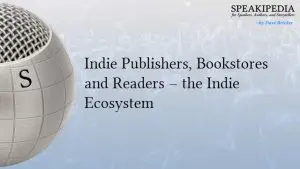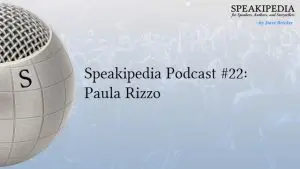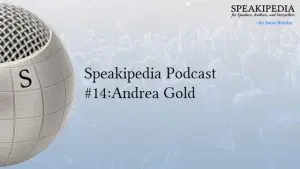 How can speakers, indie writers, and self-publishers use a blog to build a platform? This article explains how to publish online content to build community around your books.
How can speakers, indie writers, and self-publishers use a blog to build a platform? This article explains how to publish online content to build community around your books.
Build a Platform: Set up Your Blog
A blog (short for web log) is a publishing platform that enables you to publish static pages (About the Author, My Book, etc.) and a chronologically ordered stream of articles (called posts). My favorite engine for blogging is WordPress. WordPress is free and most web hosting services have an automatic installer that sets up a WordPress site with a few clicks. If you don’t want to buy a domain name and a web hosting account (or have decided that this article is already getting too technical for your tastes), start with a free account from WordPress.com. You can upgrade to your own, fully-customizable copy of WordPress that runs on your own server later. (Download your own copy from WordPress.org when you’re ready).
Build a Platform: Thoughts on Marketing
Some see marketing as all about pushing products. I disagree; marketing is about building relationships. Merchants often try to do that by proclaiming their own greatness but that backfires. Relationships are built by demonstrating relationship-worthiness—by offering value without asking for up-front payments, email addresses, etc. The mantra is “show, don’t tell.” If I tell you how wonderful I am, you’ll write me off as a narcissist. If I demonstrate wonderfulness, you’ll want to know me better.
People buy some products because they have to (toothpaste, for example). Books sometimes fall into that category (I’m a writer; I need a thesaurus) but unless assigned by a teacher, most fiction works are entirely discretionary, optional purchases made from a field of hundreds of thousands of options. Why do people buy unnecessary products? Because they like the people who created those products. “John Smith was born with no arms; he wrote this book holding the pen with his foot.” Of course, this says nothing for Smith’s writing ability but readers love his story. Of course, if you loved a writer’s first two books, you’ll run out and buy her third because you appreciate her humor, insight, style, perspective, etc. Personal human qualities can be delivered through the printed page to catalyze relationships.
So you want to sell books. So do I. So does everybody. Why will people buy them?
If you’re a non-fiction author, readers will buy your books because they need them. Computer programmers all buy reference books. But we still have to compete with other books about the same subject. That doesn’t mean we don’t put love into writing them; it simply means we create them with a target audience in mind. If your goal is to make money as a writer, the smart path is to create a supply that fills a demand. Non-fiction is almost always better for business.
Fiction can certainly be positioned to appeal to a market segment, but often, it’s art. Many writers simply want to tell their stories. These publishers value authenticity and wordcraft above product positioning. Even if you hedge your bets by writing vampire fiction or erotica for an interested reader community, you’re selling an entertainment product—a luxury item consumers will only purchase after they’ve paid for food and detergent.
Your excellent book may not be an excellent product.
Selling art is not about selling products.
Selling art is about selling artists.
A poster of a Picasso artwork can be had for $10. A signed serigraph can be had for hundreds. An original is beyond the reach of the average art lover. From ten feet away, they look identical. So what is it that people value? Clearly, it’s more than the image on the page. Art collectors want a piece of the artist’s story. The original art is an artifact; it’s all that remains of a long-gone fragment of history—the artist lost in thought, his brush poised over the canvas as he contemplates where to place the next stroke. Duplicating the results of that inspired moment is easy, but we imagine the original canvas to be a container for some essence. We’re not buying a piece of Picasso’s art; we’re buying a piece of Picasso. So rather than sell our books, we have to sell ourselves.
Readers buy great books (and pay more for signed first editions) because each book contains a fragment of the writer’s soul, but they won’t value those books until that writer has hit a certain popularity tipping point. Somewhere in the reader’s search for new books, the author’s name has to hit a certain familiarity trigger. Oh this book is by so-and-so; I’ve heard her name somewhere before. In many instances, name-brand recognition becomes more important than product quality. Does anyone really know or care if Tide detergent is any better than the store’s in-house brand? We’ve seen Tide before and whether or not we have any logical reason to, we trust it.
Which brings us back around to blogging. What should we write about and share with others that will establish us as thought leaders, artists, forward thinkers, provocateurs, and people whose souls are worth sampling? How do we insert ourselves into the collective consciousness of readers?
Build a Platform: Content
Even if you write about yourself, write about your readers. Don’t post articles about your books, and especially don’t share articles about your books on writers’ forums where other participants are most interested in their own books. Certainly, you should include static pages that describe yourself and your books, but this content should be secondary to your articles. After all, you didn’t read this far because you think Dave Bricker (who?) is so visionary; you read this far because you’re hoping I’ll live up to my stated intention to give you information that’s useful to you.
If you write vampire fiction, blog about vampires—their history and folklore. Review other books in the genre, even if that feels like stumping for the competition. Position yourself as a thought leader and information resource about vampires and vampire books. Ultimately, some readers who like vampires will conclude that your books are worth gambling $20 on because you have a) demonstrated that you’re willing to provide informative, interesting, and valuable information about the subject without asking for anything up-front, and b) because you have demonstrated a deep knowledge of the subject and likely bring that expertise to your books.
If you write about PHP scripting or cooking pastries or fixing bicycles, the same rules apply. Demonstrate subject expertise, willingness to share, and authentic value. Cultivate relationships with members of your reader community.
If your book falls under the categories of literary fiction or memoir, target reader communities may be difficult to reach or define. You may be better served to share articles about the writing and editing process, and to post reviews of books you’d like your work to be thought of as equivalent to. If you write sea novels, feel free to review Moby Dick; you don’t have to review the latest works by the latest authors. Write about books and writers you’d like to be associated with. And plan to write a fair number of reviews before you cast a shadow long enough to connect your readers to the conclusion that the same insights you bring to your reviews are likely to be found in your novels.
Build a Platform: Reality Check
Blogging is time-consuming hard work. If you have an approach to stock-trading that yields fast results or a review of this week’s bikini photos on the web, you’ll probably develop a following rather quickly, but do your homework and adjust your expectations accordingly. If you’re a literary fiction writer or an author of children’s stories, you’re going to have to work hard to find a niche that isn’t already served by another blogger. You don’t have to be the only blogger addressing your topic territory (this is only one of dozens of self-publishing blogs), but you do have to commit to years of regular writing, reviewing and reporting before you become one of the “chosen ones.” The larger and more general your audience is, the more difficult it becomes to market to it successfully—even if your book and blog are amazing in every respect.
If you’d rather skip blogging and work on your next book, that’s understandable. Keeping a blog going is a staggering amount of work—even if you post only once a month. The majority of blogs get abandoned after a few months; writers get tired of performing in an empty hall. Building a following can take years and even then…
Build a Platform: Nothing Comes From Nothing
Decades ago, I landed in Gibraltar after a very long sail. I had exactly nothing in my pockets so I pulled out my guitar and began playing in the pedestrian tunnels that lead from the waterfront into town. The first few coins were hard-won but after I had a bit of cash in my guitar case, passers-by became more eager to reward me for my musical efforts. The second day, I put a few coins in my case before I began playing. I made a lot more money.
A new blog is like a busker’s empty guitar case. Write at least five articles before you announce your new blog to the world. Visitors will be more interested if they get a sense that something is happening on your site and that they’re late—not early—to the party.
Build a Platform: Share Your Writing
So let’s assume you’ve built your author platform and went to some effort to have it professionally designed (like you did with your book). Now you have written a collection of articles you think will appeal to your readers and you want to share them.
LinkedIn.com allows you to join a maximum of 50 groups. Join 50 groups or as many as you can that offer relevant subject matter. Don’t join writer’s groups just because you’re a writer; writers will almost certainly not buy your books; look for groups that contain prospective readers.
Many WordPress widgets and plug-ins offer a LinkedIn sharing feature. Click the button, log in, enter your group names, and share your content with thousands of people. The technological mechanics of it are quite easy but before you hit the “share” button, make sure that your content won’t do more damage than good. With great power comes great responsibility. The link-sharing feature is not a spam blaster tool for plugging your new book. Write useful, provocative, non-commercial, interesting, topical content or moderators will quickly ban you from participating. Annoying your readers is no way to build community around your writing.
And of course, LinkedIn is only one source of traffic. If you write about acoustic guitars or alternative energy, take advantage of the numerous independent discussion forums and community sites that cater to niche interests.
A few words about Facebook, Instagram, YouTube, etc.: I use a Facebook page to share my blog posts, but Facebook is mostly people gossiping and posting beach party photos. Some topics will get more traction than others, but Facebook amounts to only a very tiny percentage of my site traffic. Some people get excellent results with Instagram. I use it to announce new videos but I don’t spend much effort on it. However, I guarantee you someone will write in swearing that Facebook or Instagram or YouTube is their “magic bullet.” Try different channels and track your results.
The advice here is always the same: do your homework and choose your channels carefully so you can invest your energy wisely. What works for one person won’t work for another so experiment, explore and watch your site traffic statistics to see where your visitors come from.
Build a Platform: It Isn’t About You
Remember I spoke about building relationships? Good blog posts are never overtly self-promotional. Offer useful information or at least provocation for conversation and dialog. Encourage readers to comment on LinkedIn rather than directly on your blog (sucking visitors away from any site that’s willing to host your link is bad form).
Continuing with the relationship theme, when people respond to your posts, take the time to engage them in discussion on the forums—even if they ignored your “click to read about…” article description and responded only to your article title. And be sure to engage people politely when they disagree with you. If someone takes the time to correct you and they’re correct, rewrite and give them credit for whatever they taught you. If you disagree, do so eloquently. You’re the one who started an open conversation; the party’s at your house so you’d better be there.
Build a Platform: Pay Attention to the Group Rules
LinkedIn allows third party link sharing tools to publish posts to multiple groups but not all group moderators are as enthusiastic about that as the blogging community is. Sadly, some insist that all offsite links be posted under the “promotions” tab—even if your content is not overtly promotional. I can’t imagine why anyone would bother to read content that’s labeled “promotional”; forced inaccurate labeling will diminish your response rate. Other group moderators don’t allow any third party links at all. Moderators have a huge amount of spam to sort through, and these kinds of “broad brush” rules make their jobs tolerable. Though I encourage group managers to adopt a “white list” policy where bloggers can apply for permission to post content that meets stated guidelines and supports the spirit of the group, many don’t have the time or patience. That’s understandable. When in doubt, don’t argue. Either comply or leave and find another group that’s more accommodating. Or start your own group and make your own rules.
Build a Platform: Cooperation vs. Competition
In this post, I have already mentioned a “competing” book and a “competing” blog. But Joel Friedlander’s blog doesn’t stop people from reading my blog, and Dan Poynter’s book doesn’t prevent people from buying mine. Our content is out in the world where people can sample it and make the choices that suit them best. When possible, build alliances with other bloggers. Point your readers to worthwhile content posted by your “competitors” and they’ll often share your best work with their own communities. Ultimately, cooperation and collaboration paint a friendlier, more sportsmanlike portrait of you for new readers.
Build a Platform: See What Sticks
Over my years of blogging, I have written about writing, marketing, book typography, cover design, and publishing industry topics. Every time I publish a new post, I watch the visitor statistics to measure my response rate. Sometimes, what seems like a hot topic just doesn’t stick. Other times, something that seems trivial will get a huge response. By far my most popular post was How Many Spaces After a Period? , and it’s still pulling traffic. Whodathunkit? Over time, you’ll develop a good sense of what your readers want—good research for your next book.
Build a Platform: Conclusion
Be realistic about whether your book is worth marketing—even if it’s worth reading. Don’t confuse the two.
How you share is the easy part; what you share requires thought, adherence to good forum etiquette and hard work.
Demonstrate relationship-worthiness by offering value to readers, not by talking about how great you are.
Spamming discussion groups will certainly result in the massive backfiring of any plans to sell books and position yourself as a leader.
When it comes to blogging and book marketing, cooperation trumps competition. If you’ve written “the other” great book on a subject, interested readers will buy your book, too. Offer links to other sources of valuable information and insight. The loyalty you earn will outweigh the traffic you send elsewhere.
Building a publishing business is just like building any other kind of business (except it’s generally even slower and more difficult to accomplish). Be realistic about how much time, effort, energy, and money it takes to build and maintain a blog.
A poorly designed blog makes as weak an impression as a poorly designed book. Technical problems will inevitably arise.
Track your traffic to see what your reader community wants to read about.
Participate in conversations you start—both on your blog and in discussion forums.
Respect the rules set by forum moderators—even if you think they’re Draconian. When in doubt, communicate; ask permission.
Love the journey. Let the destination come to you.





